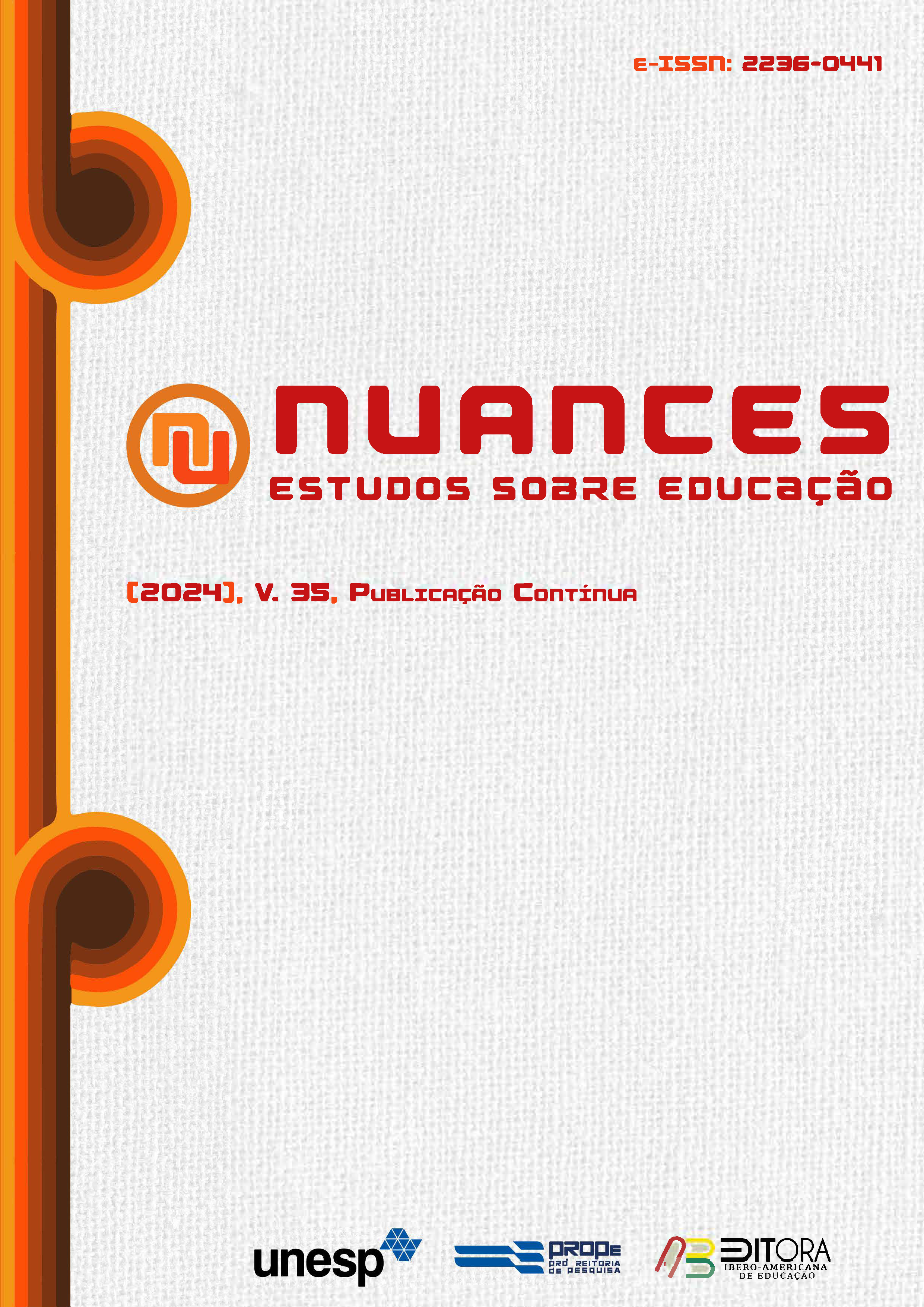Uso de lenguaje obsceno entre los jóvenes
DOI:
https://doi.org/10.32930/nuances.v35i00.10657Palabras clave:
Lenguaje obsceno, Juvenil, Profanidad, DiscursoResumen
El estudio se centra en el uso de blasfemias entre la juventud moderna haciendo hincapié en sus aspectos psicológicos, sociales y educativos. Los autores emplean un enfoque metodológico mixto que combina encuestas cuantitativas y entrevistas cualitativas con estudiantes de la Universidad Industrial de Tyumen (Tyumen, Rusia). Los autores proponen una clasificación de las razones que impulsan a los jóvenes a utilizar un lenguaje obsceno y determinan sus especificidades. Las razones psicológicas que subyacen al uso de palabrotas incluyen la necesidad de integración, atención, catarsis, autoexpresión y libertad. La importancia teórica y práctica del estudio radica principalmente en la recopilación, sistematización y generalización de material sobre el lenguaje obsceno y la elaboración de las razones de su uso. El estudio proporciona una base para las sesiones de formación destinadas a desarrollar la cultura del habla de los alumnos, fomentar su capacidad de autorregulación y aliviar la tensión en situaciones de estrés. Las conclusiones pueden ser utilizadas por psicólogos, lingüistas y profesores en la labor preventiva y educativa en organizaciones educativas.
Descargas
Referencias
BANDURA, A. Social Foundations of Thought and Action: A Social Cognitive Theory. Prentice-Hall, 1986.
DEBRAY, C. Swearing, identity and power in professional interaction. Journal of Pragmatics, v. 215, p. 145–158, 2023. DOI: 10.1016/j.pragma.2023.07.002.
GARIAEV, P. P. Volnovoi geneticheskii kod. Moscow: Izdattsentr, 1997. p. 108.
GRISHEVA, K. A.; KONDRATEI, M. V.; TKACHENKO, V. V. Nenormativnaia leksika, osnovnye faktory ee upotrebleniia. Young Scientist, [S. l.], v. 6, n. 65, p. 654–658, 2014.
HUSAIN, W.; WASIF, S.; FATIMA, I. Profanity as a Self-Defense Mechanism and an Outlet for Emotional Catharsis in Stress, Anxiety, and Depression. Depression research and treatment, 8821517, 2023. DOI: 10.1155/2023/8821517.
LEVIN, I. I. Ob obstsennykh vyrazheniiakh russkogo iazyka. In: LEVIN, I. I. Izbrannye trudy. Poetika. Semiotika. Moscow: Iazyki russkoi kultury, 1998. p. 809–919.
MITIN, A. N. Tot, kto pervym obrugal sopernika, zalozhil osnovy sovremennoi tsivilizatsii [The first man to swear at his rival laid the foundations of modern civilization]. Business, Management and Law, [S. l.], v. 3, n. 20, p. 29–34, 2009.
PRONIUSHKINA, T. G.; KOMAROVA, V.A. Vliianie nenormativnoi leksiki na psikhosomaticheskoe razvitie lichnosti [The influence of profanity on psychosomatic personality development]. Naukosfera, [S. l.], n. 9, p. 14–18, 2020.
PUBLIC OPINION FOUNDATION. Results of public opinion polls on politics, economics and everyday life of Russians. Available: https://fom.ru. Accessed: 14 Jan. 2024.
SEMENKOVA, S. N.; TABURKIN, V. I.; DORONINA, M. V.; KRYUCHEVA, Y. V.; GAVRILYUK, N. P. Modern science in moral dimension. Dilemas Contemporaneos: Educacion, Politica y Valores, [S. l.], v. 6, n. 3, art. 98, 2019.
STAPLETON, K.; BEERS FÄGERSTEN, K.; STEPHENS, R.; LOVEDAY, C. The power of swearing: what we know and what we don't. Lingua, [S. l.], v. 277, p. 103406, 2022.
SUDAKOVA, M. V.; GRIGOREVA, T. Iu. Teoreticheskie podkhody k izucheniiu problemy ispolzovaniia nenormativnoi leksiki v teorii i praktike nauchnogo znaniia [Theoretical approaches to the problem of profane language usage in the theory and practice of scientific research]. Eurasian Scientific Association, [S. l.], v. 5-6, n. 63, p. 470–472, 2020.
SVETORUSIE. Vliianie mata na zdorove cheloveka [The impact of swearing on human health]. LiveJournal, [S. l.], nov. 18, 2017. Available: https://svetorusie.livejournal.com/77351.html. Accessed: 14 Jan. 2024.
TAJFEL, H.; TURNER, J. C. An integrative theory of intergroup conflict. In The Social Psychology of Intergroup Relations. Monterey: Brooks/Cole, 1979. p. 33-47
ZHELVIS, V. I. Pole brani. Skvernoslovie kak sotsialnaia problema v iazykakh i kulturakh mira [The battlefield of profanity. Profanity as a social problem in world languages and cultures]. Moscow: Ladomir, 2001. 349 p.
Publicado
Número
Sección
Licencia
Derechos de autor 2024 Nuances: estudos sobre Educação

Esta obra está bajo una licencia internacional Creative Commons Atribución-NoComercial 4.0.
Atribuição-NãoComercial
CC BY-NC
Esta licença permite que outros remixem, adaptem e criem a partir do seu trabalho para fins não comerciais, e embora os novos trabalhos tenham de lhe atribuir o devido crédito e não possam ser usados para fins comerciais, os usuários não têm de licenciar esses trabalhos derivados sob os mesmos termos.





